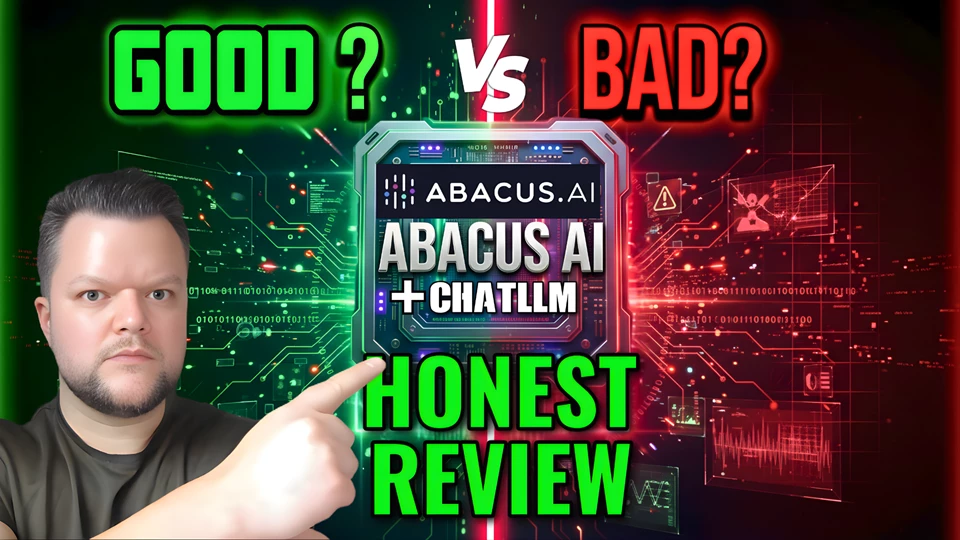Abacus AI is an AI platform focused on making advanced machine learning, generative AI, and personalization usable for real businesses without requiring a huge in‑house ML team. It’s used for things like product recommendations, demand forecasting, fraud detection, content generation, and now chat-based assistants (like the ChatLLM product you’re using).
Below is a breakdown of Abacus AI as a platform, not just this chat interface.

Buy Abacus AI now (Discount LINK)
Core Idea: What Is Abacus AI?
Abacus AI is an end‑to‑end AI platform that lets you:
- Connect data (databases, warehouses, streams)
- Train or use prebuilt ML & generative models
- Deploy them as APIs or into your applications
- Monitor performance and drifts over time
It aims to remove a lot of the engineering pain around:
- Managing training/inference infrastructure
- MLOps (versioning, deployment, monitoring)
- Keeping models up‑to‑date with fresh data
Key Features Of Abacus Ai
1. Prebuilt Use-Case Templates
Abacus AI offers “recipes” or blueprints for common problems:
- Recommendations & Personalization
- Product recommendations, “People also bought”, content ranking
- Forecasting
- Demand, inventory, revenue, capacity planning
- Fraud & Anomaly Detection
- Transactions, user behavior, security monitoring
- NLP & Text
- Text classification, search, summaries, alerts, ticket routing
- Generative AI
- Chatbots, knowledge assistants, content generation
You can usually start from a template, plug in your data, and let the platform train/evaluate multiple models automatically.
2. AutoML + Custom Modeling
Abacus AI automates:
- Feature engineering
- Model selection & hyperparameter tuning
- Evaluation & comparison
But it also allows advanced users to:
- Bring their own models
- Customize architectures or pipelines
- Integrate with external systems
So it works for both “no/low‑code” users and data scientists.
3. Generative AI & Chat (ChatLLM, DeepAgent)
On the generative side, Abacus AI offers:
- ChatLLM (what you’re using):
- Chat-based interface over multiple LLMs via its RouteLLM technology.
- Team features (workspaces, permissions, usage tracking).
- RouteLLM APIs:
- Single API to access various state-of-the-art LLMs (e.g., OpenAI, Anthropic, others) with routing, fallbacks, and logging.
- DeepAgent:
- A more advanced “agentic” assistant that can generate complex files, apps, and workflows.
These are targeted at teams wanting LLM capabilities with governance and observability, not just a raw model endpoint.
4. Data Connectors & Pipelines
Abacus AI integrates with common data sources (data lakes, warehouses, application DBs, event streams). You can:
- Schedule retraining
- Keep models in sync with updated data
- Push predictions back into your apps or warehouse
This is important for productionization vs. just playing with models.
5. Deployment & MLOps
The platform handles:
- Scalable, low‑latency inference APIs
- Canary deployments / A/B testing
- Monitoring performance, data drift, and model drift
- Version control of models and experiments
This is where many DIY ML projects fail; Abacus AI tries to cover the “last mile.”
Pros
- End‑to‑end platform: Data → Model → Deployment → Monitoring in one place.
- Good for teams with limited ML ops: You don’t need to build infrastructure from scratch.
- Strong for personalization & forecasting: These use cases are well‑supported with templates.
- LLM routing & observability: RouteLLM and ChatLLM help you safely use different large models with usage controls and logs.
- Enterprise features: SSO, audit logs, permissions, governance, etc.
Cons / Limitations
- Not a “raw notebook” platform first:
- If you want full low‑level control of every piece of infra and run everything in your own custom stack, you might prefer something like plain cloud ML + Kubeflow or similar.
- Best value for teams, not hobbyists:
- It’s built for businesses; if you’re just a solo dev wanting cheap GPU time, it’s overkill.
- Learning curve for full platform:
- While templates are simple, if you use advanced features (custom models, complex pipelines), expect onboarding time like any enterprise platform.
Pricing & Plans (High Level)
For ChatLLM Teams (this chat product you’re using):
- Two main tiers:
- Basic – $10/user/month
- Pro – $20/user/month
- No free trial; usage is tied to credit consumption.
- You can see your credit usage and manage/cancel by going to your profile page in the app:
For RouteLLM APIs and broader Abacus AI platform:
- Pricing, supported models, and details are documented here:
- For full platform/enterprise pricing, companies typically talk directly with Abacus AI sales.
For more questions about pricing, credits, limits, or billing, refer to:
Best Use Cases
Abacus AI is a good fit if you:
- Are a startup or enterprise wanting:
- Recommendations, forecasting, or fraud detection in production.
- LLM-based assistants embedded in internal tools or customer-facing apps.
- Want MLOps handled so your team can focus on data and product logic.
- Need central governance over AI usage (auditing, permissions, observability).
It’s less ideal if:
- You just want cheap GPU access to train arbitrary models yourself with full infra control.
- You’re only experimenting and don’t plan to deploy anything to production.
Summary
Abacus AI is a production-focused AI platform combining:
- Traditional ML (recommendations, forecasting, anomaly detection)
- Generative AI (chat, content, code)
- Strong data and MLOps tooling
For companies that want real-world AI systems running reliably without building an entire ML infrastructure and ops team, it’s a strong option. For individual tinkerers, it’s probably more platform than you need.
If you tell me what type of user you are (e.g., “crypto YouTuber wanting an AI assistant”, “SaaS founder”, “data scientist at a mid‑size company”), I can give you a more opinionated verdict on whether Abacus AI fits you and which piece (ChatLLM, RouteLLM, or full platform) makes the most sense.


1 thought on “Abacus AI Review: Features, Use Cases, Pricing & Who It’s Best For”
Comments are closed.